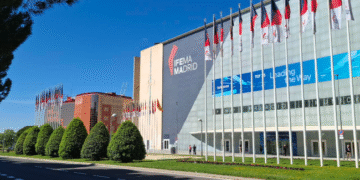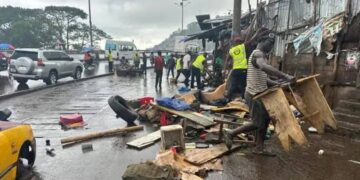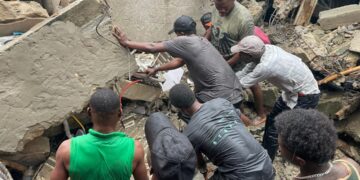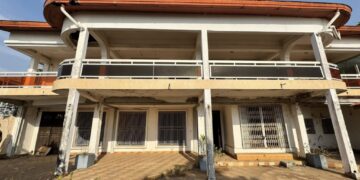Kroo Bay, nestled along the coastline of central Freetown, stands as one of Sierra Leone’s most densely populated informal settlements. Despite its proximity to prominent landmarks, such as Cotton Tree and Pademba Road Prison, Kroo Bay grapples with economic hardships and urban decay. The vibrant spirit of the community is shadowed by the stark social injustices that define Freetown.
Crime thrives in Kroo Bay, fueled by poverty, overcrowding, and the rapid pace of urbanization. The Sierra Leone Police’s (SLP) 2023 Crime Statistics Report unveils the magnitude of this challenge, offering a detailed overview of crime trends and public safety concerns nationwide.
The report, based on data from January to December 2023, highlights a total of 30,491 criminal and road crash cases reported and investigated across Sierra Leone’s six Police Command Regions. Although there was a marginal 0.4% decrease compared to the previous year, the Western Region, encompassing Freetown and Kroo Bay, accounted for a staggering 62% of all cases, underscoring the pressing issues in the country’s most urbanized area.
Life in Kroo Bay is shaped by its precarious geography and limited resources. Wedged between the sea and low-lying flood plains, the settlement suffers from poor drainage, a lack of basic services, and frequent flooding during the rainy season. These environmental challenges create fertile ground for social instability and crime.
John Kanu, a resident of Kroo Bay, described his daily anxieties. “I was returning home after work when two young men stopped me. Before I knew it, they took my phone and wallet,” Kanu shared with Eyewitness News SL. “We’re used to such attacks. There’s no proper lighting here, and the streets are full of blind spots. You have to be careful even during the day.”
A 2022 survey by the Sierra Leone Urban Research Center found that over 60% of Kroo Bay’s residents reported being victims of theft or violent crime. Petty theft, armed robbery, and drug-related offences are common, with many incidents going unreported due to residents’ mistrust of the police.
The youth unemployment rate in Kroo Bay, estimated at over 50%, is a major contributing factor. Without access to education or job opportunities, many young people resort to petty crime or substance abuse as a means of survival.
Musa Kamara (not his real name), a 24-year-old resident of Kroo Bay who has served two prison terms for robbery, spoke exclusively with EyeWitnessNews. Kamara, who was released from Pademba Road Prison earlier this year, described the desperation that led him to crime. “I didn’t want to steal, but there were no jobs, and my family had nothing to eat. I joined a gang because it felt like the only way to survive,” Kamara confessed. “Most of us in Kroo Bay are just trying to get by. If the government doesn’t help us with jobs or skills training, nothing will change.”
Kamara also highlighted the growing influence of drugs in the community. “Drugs like tramadol and kush [synthetic marijuana] are everywhere. Young boys get high and lose their sense of judgment. That’s when the crimes happen,” he added.
The 2023 Crime Statistics Report offers a comprehensive breakdown of offences:
Murder: A total of 57 murder cases were reported nationwide, with Kenema in the Eastern Region recording the highest number (14 cases).Robbery with Violence: This category accounted for 121 cases, with the Southern Region reporting 14 incidents, or 11.58% of the total.
Robbery with Aggravation: The Western Region, including Freetown East and West, reported 63 cases—over 50% of all such crimes nationwide.
Petty Theft: Petty theft made up over 40% of all reported crimes, with urban settlements like Kroo Bay serving as hotspots.
Drug-Related Offenses: The report noted a sharp increase in drug trafficking and abuse, particularly in the Western Region.
The report also identified systemic issues driving crime, including poor urban planning, limited access to education, and rising income inequality.
For the Sierra Leone Police (SLP), addressing crime in areas like Kroo Bay requires a multi-faceted approach. Deputy Head of Media and Public Relations, Mohamed Bobson Sellu, outlined the force’s strategies to EyeWitnessNews.“Policing is a shared responsibility. The community must work with us to combat crime,” Sellu said. “We’re implementing both preventive and reactive measures to restore public safety.”
Key initiatives include Community Policing, Which Strengthens ties with local leaders to encourage the reporting of crimes and suspicious activities, and Youth Engagement Programs, Which Partner with NGOs to provide skills training and job opportunities for at-risk youth.
Targeted Patrols: Increasing police presence in high-crime areas like Kroo Bay, particularly during nighttime hours.
Drug Crackdowns: Working with anti-narcotics units to curb the supply of illegal substances.
Sellu emphasized the importance of public trust. “We’re working to change perceptions. The police should not be seen as enemies but as partners in building safer communities.”
Despite the grim statistics, Kroo Bay residents are growing optimistic. Community leaders, such as Alhaji Sesay, have organized crime awareness campaigns and neighbourhood watch groups.
The Kroo Bay Development Association recently partnered with international organizations to launch a vocational training centre, offering carpentry, tailoring, and computer literacy courses. “We believe that empowering young people with skills is the first step to reducing crime,” Sesay explained.
The SLP is also optimistic. “We aim to see a significant reduction in crime by the end of 2024,” Sellu said. “We’re learning from past mistakes and investing in long-term solutions.”
The challenges facing Kroo Bay are emblematic of broader issues in Sierra Leone. Poverty, unemployment, and inadequate urban infrastructure create the perfect storm for crime. While the SLP’s initiatives show promise, lasting change requires a collective effort.
For Kroo Bay, the path to progress lies in addressing the root causes of crime. Improved education, job creation, and stronger community-police relations will be key. Only then can this vibrant but vulnerable community shed its reputation as a crime hotspot and become a beacon of resilience and hope.
By: Tejan Macavoray





































